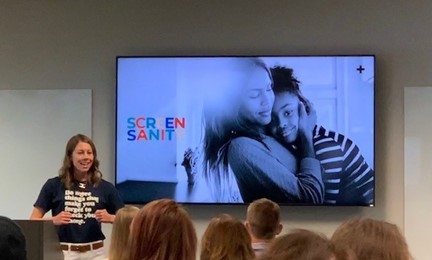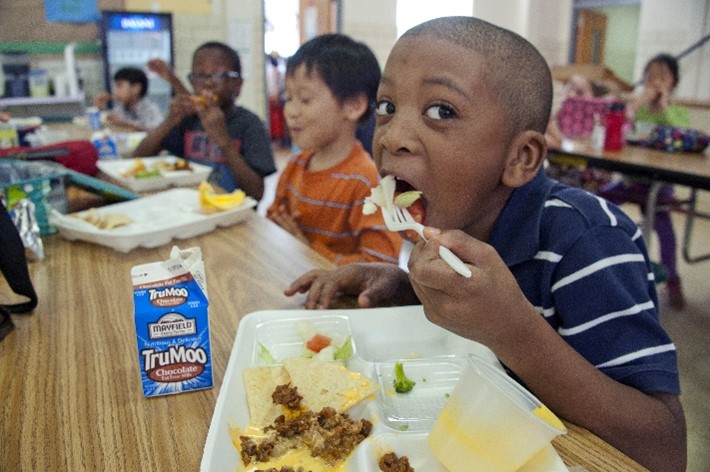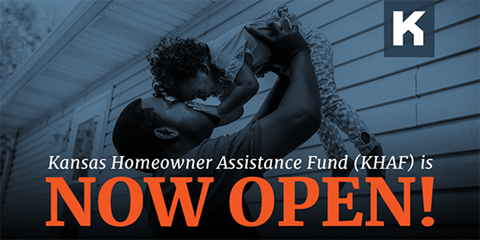UCS Hosts Event Addressing Youth, Social Media, and Mental Health
 A study conducted by Common Sense Media reported that teens spend between five and seven hours per day on social media. According to the Journal of the American Medical Association, adolescents who spend more than three hours per day using social media may be at heightened risk for mental health problems. In response to concerns about social media and youth mental health, UCS, with the Alcohol Tax Fund, Children's Coordinating Council, and the Transitional Age Youth Planning Project, invited Tim DeWeese, Director of the Johnson County Mental Health Center, and Amy Holsopple from Stand Together and Rethink Technology (START) to share tools and information with event participants to help families develop healthier relationships with technology.
A study conducted by Common Sense Media reported that teens spend between five and seven hours per day on social media. According to the Journal of the American Medical Association, adolescents who spend more than three hours per day using social media may be at heightened risk for mental health problems. In response to concerns about social media and youth mental health, UCS, with the Alcohol Tax Fund, Children's Coordinating Council, and the Transitional Age Youth Planning Project, invited Tim DeWeese, Director of the Johnson County Mental Health Center, and Amy Holsopple from Stand Together and Rethink Technology (START) to share tools and information with event participants to help families develop healthier relationships with technology.
START presented highlights from their Screen Sanity program — a conversation-starting workshop that unpacks some of the top screen time challenges facing families today. Screen Sanity features a study guide, videos, take-home tips and more. Holsopple shared that Screen Sanity is designed so that workshop attendees can bring their learnings and the program itself back to the organizations and communities they serve. Event participants were introduced to five Screen Sanity modules:
- Start with Yourself — examining how our own screen time habits influence the screen time culture in our homes.
- Tables and Bedtimes — ideas for establishing technology-free spaces.
- Accountability — an introduction to screen safety.
- Practice. Drive. — tips for how technology is introduced to children.
- Time Well Spent — focusing on offline and online activities that foster growth and strong relationships.
Each module was followed by guided group discussion. One participant shared that the program “not only brought forward heavy issues of concern, but made me more aware of my own habits with my phone.”
If you are interested in learning more, you can access START's resources, including:
- The Screen Sanity program;
- Get tips straight to your inbox by signing up for START's blog;
Follow START on Instagram or Facebook .
Free Summer Meals for Kids
Save your family time and money with free summer meals for your kids this summer! No application or registration needed, just stop by and enjoy.
To find meal sites near you, check out this map or text FOOD or COMIDA to 304-304.

Need new tools to help your friend or family member manage stress or escalation?
The Johnson County Mental Health Center and Johnson County Developmental Supports are offering an online training on the Mandt System. The Mandt System is a healthy-relationship based, learning & development platform designed to promote prevention, de-escalation and intervention approaches. This will focus on building healthy relationships, improving communication and improving conflict management skills.
Who: This is for all caregivers in Johnson County
When: 10 a.m. -2 p.m. on Saturday, July 23rd
How: Click HERE for more information and to register.
Please register by Friday, July 15th
The Kansas Homeowner Assistance Fund (KHAF) Program is Open for Applications!

Don’t wait, apply today! Funds are limited.
The Kansas Homeowner’s Assistance Fund (KHAF) program’s goal is to aid homeowners in avoiding foreclosure by assisting with homeownership related expenses.
Applicants must be at least 30 days past due on their mortgage or property taxes/charges to qualify for assistance types.
For application assistance - KHAF Call Center at 855-307-KHAF (5423) or complete the KHAF Contact Us Form.
Qualifications
- The household gross income must not be more than 150 percent (150%) of the area median income (AMI) for the County in which the property is located or 100% US Median Income. See KHAF Income Chart.
- The property must be located within the state of Kansas.
- The property must be the applicant’s primary residence.
- The applicant must be the owner of the property.
- Applicants must be at least 30 days past due on their mortgage or property taxes/charges to qualify for assistance types.
- There must be a pandemic-related financial hardship after January 21, 2021 (loss of income or increase in expenses).
- Original mortgage amount must be within conforming loan limits.
Eligible Properties
- Owner Occupied, Primary Residences (second homes and investment properties are not eligible for assistance).
- Single Family Residences, One to Four Unit Dwellings, Condos, Manufactured Homes (affixed and unaffixed) and Townhomes.
Assistance Terms
- $45,000 Max Assistance Amount (this is a combination of up to $35,000 in mortgage reinstatement and payment assistance plus up to $10,000 in property charges and utility/internet/broadband assistance) provided as a grant up to $25,000 and a two-year forgivable loan for mortgage related assistance more than $25,000.
Assistance Types
Mortgage Reinstatement Assistance
- Mortgage must be past due by at least 30 days.
- Assistance up to $35,000.
- Reinstatement assistance must bring the mortgage current by curing all past-due amounts.
- This assistance covers past due primary mortgage, second mortgages, reverse mortgages, and even non-traditional loans such as land contracts (contract for deed) or manufactured homes.
Mortgage Payment Assistance
- Must have current mortgage delinquency.
- Combined assistance (including reinstatement) up to $35,000.
- Up to six (6) months of forward payment assistance paid directly to mortgage servicer.
Property Charges Assistance
- Property charges and/or taxes must be past due by at least 30 days.
- Assistance up to $10,000 maximum (inclusive of utility/internet/broadband assistance when applicable).
- This assistance covers past due property charges including property taxes, insurance premiums (including homeowner’s insurance and flood insurance), homeowner association fees, condominium association fees, cooperative maintenance, and common charges.
Utility/Internet/Broadband Assistance
- Must have mortgage or property tax/charge delinquency to qualify.
- Assistance up to $10,000 maximum (inclusive of property charges assistance when applicable).
- This assistance covers past due electricity, water, wastewater, gas, home energy, internet, and broadband.
How do I Start?
- To apply for assistance, register for your online account and complete an on-line application.
For questions, please contact the KHAF Call Center at 855-307-KHAF (5423) or complete the KHAF Contact Us Form.


